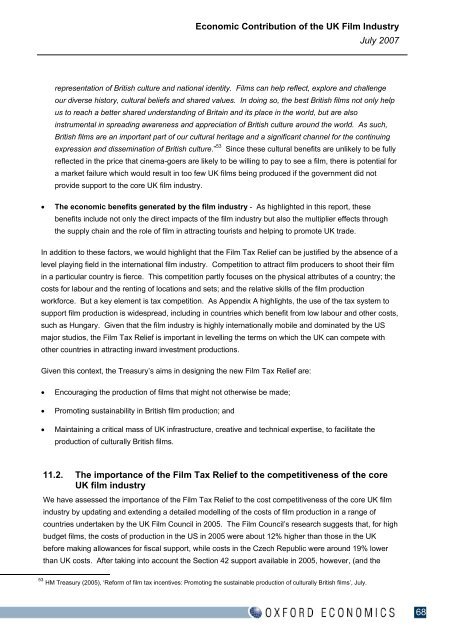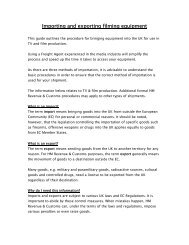The Economic Impact of the UK Film Industry - BFI - British Film ...
The Economic Impact of the UK Film Industry - BFI - British Film ...
The Economic Impact of the UK Film Industry - BFI - British Film ...
You also want an ePaper? Increase the reach of your titles
YUMPU automatically turns print PDFs into web optimized ePapers that Google loves.
<strong>Economic</strong> Contribution <strong>of</strong> <strong>the</strong> <strong>UK</strong> <strong>Film</strong> <strong>Industry</strong><br />
July 2007<br />
representation <strong>of</strong> <strong>British</strong> culture and national identity. <strong>Film</strong>s can help reflect, explore and challenge<br />
our diverse history, cultural beliefs and shared values. In doing so, <strong>the</strong> best <strong>British</strong> films not only help<br />
us to reach a better shared understanding <strong>of</strong> Britain and its place in <strong>the</strong> world, but are also<br />
instrumental in spreading awareness and appreciation <strong>of</strong> <strong>British</strong> culture around <strong>the</strong> world. As such,<br />
<strong>British</strong> films are an important part <strong>of</strong> our cultural heritage and a significant channel for <strong>the</strong> continuing<br />
expression and dissemination <strong>of</strong> <strong>British</strong> culture.” 53 Since <strong>the</strong>se cultural benefits are unlikely to be fully<br />
reflected in <strong>the</strong> price that cinema-goers are likely to be willing to pay to see a film, <strong>the</strong>re is potential for<br />
a market failure which would result in too few <strong>UK</strong> films being produced if <strong>the</strong> government did not<br />
provide support to <strong>the</strong> core <strong>UK</strong> film industry.<br />
• <strong>The</strong> economic benefits generated by <strong>the</strong> film industry - As highlighted in this report, <strong>the</strong>se<br />
benefits include not only <strong>the</strong> direct impacts <strong>of</strong> <strong>the</strong> film industry but also <strong>the</strong> multiplier effects through<br />
<strong>the</strong> supply chain and <strong>the</strong> role <strong>of</strong> film in attracting tourists and helping to promote <strong>UK</strong> trade.<br />
In addition to <strong>the</strong>se factors, we would highlight that <strong>the</strong> <strong>Film</strong> Tax Relief can be justified by <strong>the</strong> absence <strong>of</strong> a<br />
level playing field in <strong>the</strong> international film industry. Competition to attract film producers to shoot <strong>the</strong>ir film<br />
in a particular country is fierce. This competition partly focuses on <strong>the</strong> physical attributes <strong>of</strong> a country; <strong>the</strong><br />
costs for labour and <strong>the</strong> renting <strong>of</strong> locations and sets; and <strong>the</strong> relative skills <strong>of</strong> <strong>the</strong> film production<br />
workforce. But a key element is tax competition. As Appendix A highlights, <strong>the</strong> use <strong>of</strong> <strong>the</strong> tax system to<br />
support film production is widespread, including in countries which benefit from low labour and o<strong>the</strong>r costs,<br />
such as Hungary. Given that <strong>the</strong> film industry is highly internationally mobile and dominated by <strong>the</strong> US<br />
major studios, <strong>the</strong> <strong>Film</strong> Tax Relief is important in levelling <strong>the</strong> terms on which <strong>the</strong> <strong>UK</strong> can compete with<br />
o<strong>the</strong>r countries in attracting inward investment productions.<br />
Given this context, <strong>the</strong> Treasury’s aims in designing <strong>the</strong> new <strong>Film</strong> Tax Relief are:<br />
• Encouraging <strong>the</strong> production <strong>of</strong> films that might not o<strong>the</strong>rwise be made;<br />
• Promoting sustainability in <strong>British</strong> film production; and<br />
• Maintaining a critical mass <strong>of</strong> <strong>UK</strong> infrastructure, creative and technical expertise, to facilitate <strong>the</strong><br />
production <strong>of</strong> culturally <strong>British</strong> films.<br />
11.2. <strong>The</strong> importance <strong>of</strong> <strong>the</strong> <strong>Film</strong> Tax Relief to <strong>the</strong> competitiveness <strong>of</strong> <strong>the</strong> core<br />
<strong>UK</strong> film industry<br />
We have assessed <strong>the</strong> importance <strong>of</strong> <strong>the</strong> <strong>Film</strong> Tax Relief to <strong>the</strong> cost competitiveness <strong>of</strong> <strong>the</strong> core <strong>UK</strong> film<br />
industry by updating and extending a detailed modelling <strong>of</strong> <strong>the</strong> costs <strong>of</strong> film production in a range <strong>of</strong><br />
countries undertaken by <strong>the</strong> <strong>UK</strong> <strong>Film</strong> Council in 2005. <strong>The</strong> <strong>Film</strong> Council’s research suggests that, for high<br />
budget films, <strong>the</strong> costs <strong>of</strong> production in <strong>the</strong> US in 2005 were about 12% higher than those in <strong>the</strong> <strong>UK</strong><br />
before making allowances for fiscal support, while costs in <strong>the</strong> Czech Republic were around 19% lower<br />
than <strong>UK</strong> costs. After taking into account <strong>the</strong> Section 42 support available in 2005, however, (and <strong>the</strong><br />
53 HM Treasury (2005), ‘Reform <strong>of</strong> film tax incentives: Promoting <strong>the</strong> sustainable production <strong>of</strong> culturally <strong>British</strong> films’, July.<br />
68

















